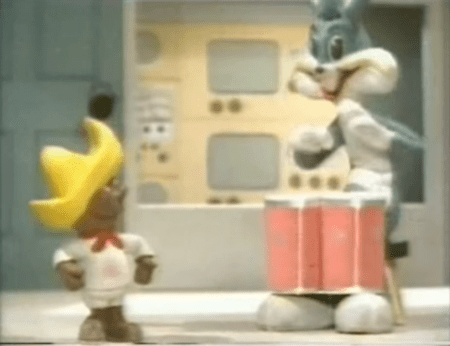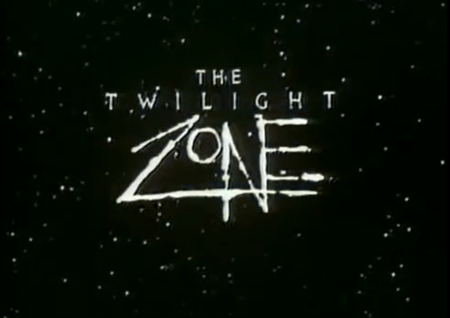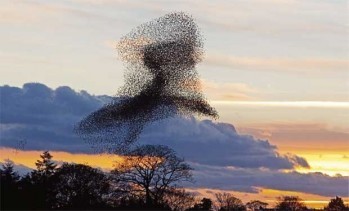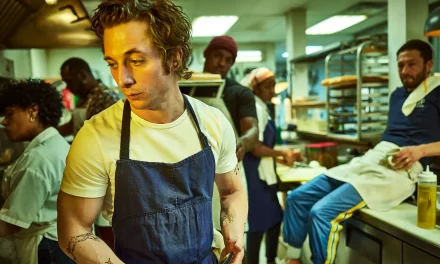My wife and I love elephants. They seem to be such caring, gentle creatures. And because of the shaping of their mouths behind their trunks, we graft that onto what we associate with human physiognomy and assume that they’re smiling and so that therefore these are happy animals. So we love them.
We have a little elephant of our own. Well, I say ‘our own’, but he’s a bit more of a time-share really. We adopted him and pay a bit of money each year to make sure he’s looked after. And each year he sends us a new photograph of himself and writes us a letter to tell us what he and his herd have been up to. And we’d like to think that he’s mixing with pachyderm pals who may even be the TV stars of yesterday – hangin’ out with Little Blue and his crew, chillin’ with Mumfie and maybe shootin’ some pool with Pippy the Telephant.
We keep him in Africa. This is not because we fear that he would be taking work from British quadrupeds. We strongly believe in freedom of movement so that people with skills and talents can maximise their market value. It is simply – in his case – that the Amboseli National Park is more of a natural habitat and less cramped for him than our rather small back garden.
You see, even although he’s quite young, he’s actually getting quite big quite fast.
Television – to paraphrase Douglas Adams – is big. You just won’t believe how vastly, hugely, mind-bogglingly big it is. And that’s started to become a problem for me in recent years. My problem, I suspect. Nobody else’s. After all, it means there’s more television to go around – meaning more jobs and greater variety and better quality. Right?
A year or so ago – or possibly some other time – I acquired an academic book that I didn’t get on with terribly well. This experience wasn’t because of my usual bugbear of people confusing film and videotape and failing to use the correct verbs for either [i]. No, this disappointment was due to my feeling short-changed in that the book’s title wasn’t delivering what it had promised me.
What it had promised me – by its online description – was a historical study of one sub-genre of television for one nation. And since this was a sub-genre and a nation of particular interest to me from decades of TV viewing, I thought ‘I’m well up for a slice of that’ and got my order in. There were several examples of series in this sub-genre that I’d never seen covered before – and I was convinced that this new addition to my library was the volume that would bridge that gap like a Cadbury’s Snack.
But it didn’t.
First of all, the series that I really wanted to see covered – because in the last decade I’d realized how important and overlooked it was – wasn’t there. The reason it wasn’t there was covered in a caveat in the introduction which explained why a whole sub-sub-genre was being omitted. Fine. Fair enough. Your book, your call – although I would question why Chapter 4 was devoted to another show which was from exactly the same sub-sub-genre which had been excluded in the introduction – denying me a slice of 1960s goodness. But – hang on – of the chapters that are here, a good 70% of them are about the same old usual suspects. And the same old examples within the same old usual suspects. And – oh hump! – why isn’t that landmark thing from the 1950s getting some decent coverage? This is a very, very important strand – and yet it’s been airbrushed out of history.
I was – to quote Douglas Richardson – a rabbit of negative euphoria.
And of course, as usual with most things in life, the problem was with me. Not with the book. The author did what they needed to do to make even a sub-genre without one or more sub-sub-genres fit into fnarg-hundred pages. I come from the days of books like TV Detectives by Richard Meyers (Barnes: 1981) – from decades past when you could reasonably fit an overview of a single English-speaking sub-genre comfortably into a large tome of just under 300 pages (with pictures) because it’s only about 30 years-worth of sleuthing. An era when Leslie Halliwell could periodically package everything you needed to know about television in a publication the size of two housebricks but presented in attractive primary and secondary colours.

Fig 2: You used to be able to get this really cheaply in UK remainder shops. Sorry Ric – if you’re looking in. But it was a super book! I still love it. Thank you!
And all this poor writer was doing was finding a practical solution to the problem that has increased in recent years for me: fitting television into my life.
Once upon a time… television did used to fit. It always fitted. Even when I had a job and a career and stuff like that. I mean, let’s take the week of 22-28 October 1988 and glance back through the Radio Times and TVTimes for those seven days (noting, with delight, that the latter had a cartoon elephant reminding me that British Summertime ends at 2am Saturday night and that I should put the clocks back).
My main small screen fixes are broken down by science-fiction, thriller (detectives ancient and modern), comedy and general archive. And the schedules for the four channels allow me to be across most of this. On Saturday, there’s a repeat of The Bionic Woman (1976-1978) adventure Deadly Ringer on Central – my local ITV station – at 11.30am which is handy because I missed it in November 1977 – but I don’t need to bother with Star Fleet (1982-1983) at 12.30pm because I saw that just a few years back. Might catch The Return of the Antelope (1986-1988) at 4.15pm if I’m not doing anything. And if I’m up late, I may just tune into the repeat of The Odd Couple (1970-1975) on BBC1 at 11.15pm.
On Sunday, I like to catch the 10.30am repeat of Follyfoot (1971-1973) if I can because when I was in the target age group I was naïve enough to believe that it was a gender-stereotyped girly show about horses rather than a gritty metaphor for people who have been abandoned. There’s a Lost in Space (1965-1968) on Channel 4 at 1pm, and as this is a series that I’ve not had chance to see properly before I’ll be keen to catch up with the Jupiter 2 crew on whatever cost-conscience escapade they’re up to this week.
Monday means I can set the video to grab me a 1970 edition of Ironside (1967-1975) on BBC1 at 2.15pm while I’m grafting silicon at work, and having watched that when I get home there’s the next episode of Granada’s adaptation of Len Deighton’s Game, Set & Match (1988) at 9pm. Tuesday brings me a party of Germans visiting Fawlty Towers(1975-1979) at 8pm on BBC1 (and how can I miss that?) after which I can switch to ITV for The Return of Shelley(1988) at 8.30pm (not as good as the parent series… but still…). Then at 9.30pm, the new PI series South of the Border (1988-1990) on BBC1 is every bit as stylish as the Radio Times promises me it would be…
Wednesday is a good night. After my Mork & Mindy (1978-1982) rerun on Channel 4 at 5.30pm, I get to see Robert Conrad guesting in that night’s Mission: Impossible (1966-1973) at 6pm in BBC2’s DEF II slot (I can actually recall bits of this one from 1972). There’s the final instalment of a particularly good Dalek story waiting for me in my belov’d Doctor Who (1963-1989) at 7.35pm on BBC1 and if I set the machine for 2.45am on Central, I gets me another edition of this new-fangled colour version of The Twilight Zone (1985-1989).
McCall is still a bit on the side-lines following Edward Woodward’s heart attack, but The Equalizer (1985-1989) on Central at 9pm is a must for me nevertheless. The 1959 offering from The Untouchables (1959-1963) at 11.35pm on BBC1 is more optional – but I may still take a look. Friday then presents me with two US series of different vintages – The Phil Silvers Show (1955-1959) at 7.05pm on BBC2 and then another heavily-edited episode of Beauty and the Beast (1987-1990) at 8pm on Central but the TVTimes can’t tell me which one because the ITV schedulers probably won’t figure out which edition they can air in this highly-inappropriate time slot until shortly before transmission.
That’s my week and it’s all do-able. If needsbe, I can invoke the ancient, magical oath “By the power of Betamax!” and everything can be time-shifted neatly as required… but it will all fit. I can consume all the telefantasy I want, and a lot of archive and some action-thrillery type-stuff. Look – I even have Sunday night free! Oh, what shall I do with all that time? I could read a book. I could go out for some exercise. I could meet up with some mates. Or… I could watch that copy of The Spy in the Green Hat (1967) that I recorded off BBC1 in 1983. I’ll leave to you to decide which option I went for… [ii]
But the point is: it all fits. Amidst household chores and crafting the new generation of telecoms kit, I had a disposable three or four hours on a weekday evening to gorge myself silly on the kind of TV I enjoyed. Supply did not exceed capacity to consume.
Of course, that was when on a weekly basis I had about 240 hours of output from BBCs 1 and 2 (some of which were pages from Ceefax), 168 hours from Central and about 120 hours from Channel 4 – a total of 528. Looking at this week’s Radio Times here now in the present, frugal Freeview alone gives me access to 40 channels (not even including outlets like ForcesTV) most of which offer non-stop schedules… which is 6720 hours a week. Over ten times what was available 32 years ago.
Which is why, last night, my wife and I had to ponder on how our disposable three or four hours should be allocated. Budgie [iii] (1971-1972) is on Talking Pictures at 9pm – concurrent with the rather lovely new version of All Creatures Great & Small (2020-) on 5. But, backlogged on the twin hard-drive recorder, we also have from last night Famalam (2017-) from BBC Three [iv] and NCIS (2003-) from 5USA… plus, we’ve still not yet watched back the two episodes of Battlestar Galactica (2003-2009) which BBC Two aired at some ungodly hour over the weekend. As such, we’re also ready a bit choked and realising that our decision not to follow Buffy the Vampire Slayer (1997-2003) on E4 because it’s stripped daily at 11pm was a wise one… no matter how much we’d love to see it. And even although I have a hankering for the low-life fun of Minder (1979-1994) on ITV4 I know that its frequency in the listings means that that won’t be happening either. Meanwhile, shouting at us from the shelves under the stairs are abandoned and unwatched box sets ranging from The Aphrodite Inheritance (1979) to Z Cars (1962-1978).
What we are faced with is now a zero-sum situation. We cannot add anything to our viewing schedule without losing something else. We’ve been at capacity for years due to the increases in channels and broadcasting hours and shiny discs. And because we love archival shows which are history, we also know that there’s most history being created all the time. Another 15 seconds of it was created just now while I was typing this.
When I started to research archival television in the late 1970s, there wasn’t that much of it. Basically, about three decades – and you couldn’t get to watch much of it anyhow. And anyway, not much happened in the Fifties. In the UK there was Hancock’s Half Hour (1956-1960) and in the US there was Twelve Angry Men (1954) – that was about it. And since Hancock’s Half Hour did Twelve Angry Men anyway, that makes it even simpler. Things got going in the Sixties; somebody invented Dennis Potter [v] and somebody else discovered that you could animate Bendy Toys to mime to old Stan Freberg records for Crackerjack (1955-1984,2020-) [vi]. Possibly the former saw the latter and came up with Pennies from Heaven (1978). By the end of the decade, LWT had started to screen On the Buses (1969-1973)… so, sadly, in most people’s eyes, television had finally arrived.

Fig 4: Michael Gambon and Bill Paterson: ‘Into Each Life Some Rain Must Fall’. The Singing Detective (1986)
As such, TV history for me was effectively about 20 years-worth – accessed in strictly rationed doses via BBC seasons like Festival 40 (1976). During the 1980s, the flow of television was comparatively finite. I could stay across my favourite types of transmission as BBC2 and Channel 4 opened the archival sluice gates, their transmissions bringing my reference books to life on the small screen. I was thrilled! But even so, by 1989, archive TV had effectively increased as a thing by 50%. The 1990s were still do-able as my original concept of archive TV doubled and cut-price VHS tapes became another source of delight.
But with more channels and international accessibility offering more countries, only a short time into the 21stCentury it was all far too much. It was always fun to gorge on a Wagon Wheel biscuit, but to do so on the new jumbo size would now require severe facial surgery.
The opportunities in our lives have often outgrown our capacity to take them – certainly in television terms. I mean, you’re reading this now when probably your time should have been spent reading John Ellis’ analysis of how TV has become too technological or Elke Weissmann’s look at Raymond Williams and alienation. And if you are reading those rather than this then can I just say: “Well done! Wise choice!”
So, careful selection of how we sample this vast subject is now very important. Which is why I should be applauding the author of the single-nation sub-genre book for their ability to efficiently pack in key elements rather than scorn them for not attempting the impractical. They practice pragmatic prioritization. It’s me that needs to get a sense of scale and understand that my out-dated perspective on consuming and understanding vast tracts of the schedule can only cause me misery if I don’t keep an eye on it.
Our little elephant grew up. Each year in the photos, he was a bit bigger. And we knew that he would end up being VERY big – as he is now. It’s what elephants do.
But I still can’t grasp that my favourite medium has grown up to be so big.
Andrew Pixley is a retired data developer. For the last 30 years he’s written about almost anything to do with television if people will pay him – and occasionally when they won’t. And he can’t hang about to write any more of this biog because Drama have now started stripping the original version of All Creatures Great & Small (1978-1990) and these things won’t watch themselves.
Footnotes
[i] But since you’re asking – which you must be, otherwise you wouldn’t be wasting your time down here in the footnotes – to my mind the correct past participles are as follows. Videotape: ‘recorded’, ‘taped’ or ‘videotaped’. Film: ‘shot’, ‘filmed’ or – if you’re feeling in a particularly artistic muse – ‘lensed’. Yes, I know that that’s not how people who actually make proper television programmes professionally for a living talk but – take it from me, a bloke who’s never had anything to do with the industry at all – if they did, the world would be a better, more ordered place.
[ii] That’s right. I read a book. The Man from UNCLE Book by Jon Heitland (St Martin’s Press: 1987).
[iii] Yes, I know the lead character very closely resembles something nasty you’ve scraped off your shoe, but the stories are good and Keith Waterhouse and Willis Hall did write brilliant dialogue for the supporting characters. Also, if we don’t watch, then Charlie Endell will send Laughing Spam Fritter to work us over, so, y’know…
[iv] Okay, so it’s really BBC One. But it’s their illusion and we hate to shatter it. It’s just DEF II again really…
[v] Probably Mr and Mrs Potter.
[vi] CRACK-ER-JACK! If you’re in the UK, you are obliged to give the accepted response. It’s The Law.







